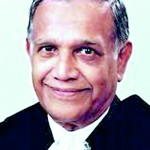Sunday Times 2
Revamp international law to save planet
Not many listeners would call Sri Lanka’s internationally-known jurist, author and academic, Judge Christie Weeramantry an entertaining speaker.
That is not all that important. For Weeramantry’s strength lies in that he is a thought-provoking speaker, one that makes his audience listen and think. His reservoir of knowledge and earnestness in pleading his cause requires, nay demands, one’s concentrated attention.
Weeramantry is the thinking-man’s speaker for he draws on his extensive knowledge of the law, of world religions, of philosophy, of the customs and traditions of various races and communities, and practical experience as a professor of law and a judge of the

This AFP picture taken on September 3, 2003 shows victims of the Marshall Islands nuclear tests protesting outside the US Embassy in Majuro calling on the US to continue funding compensation and medical treatment programmes. The tiny Marshall Islands is dragging the USand eight other nuclear-armed countries to the UN's highest court for failing to halt the nuclear arms race and rid the world of atomic weapons. Representatives of the Marshall Islands filed... separate applications against nine states, the Hague-based International Court of Justice said in a statement on Friday. AFP
International Court of Justice in which he served as vice-president, to buttress and embellish his case.
Earlier this month Judge Weeramantry was in London to deliver an important address to a conference organised by the Public Interest Environmental Law, UK (PIEL UK) an increasingly important organisation started some seven years ago by a group of students with the aim of furthering the understanding of environmental justice and advocate for justice for all.
Judge Weeramantry fitted the bill like a glove for one of the subjects was “International environmental law and its role in mitigating, preventing and facilitating environmental harm related to business activities.
About seven months ago in London I had heard Judge Weeramantry speak on the need to structure international law to serve the goal of protecting our environment and warned that if mankind went along destroying the environment as it does today and has done for several centuries, there would not be future generations.
On that occasion he held his audience of barristers, solicitors, students of the law and an interested public captive as he delved deep into religion and philosophy and ancient wisdom to decapitate the western view, or myth as some might well say, that international law was a western creation and that it originated in western academia.
It shook an essentially western audience from their complacency for such debunking began with Judge Weeramantry drawing on the wisdom of the world’s major religions which obviously seemed new knowledge to many.
Drawing on these religious teachings was like turning the knife in the wound as all the religions referred to had their origins in Asia and so the fount of wisdom and teachings were oriental and not occidental or western as popularly called.
This time round Judge Weeramantry went a step further. He was now addressing not only lawyers interested in international law and how it all began but an audience that had a much wider interest.
They were concerned with the environment and how to mitigate the deleterious effects of senseless destruction. More importantly, the conscious and continuing devastation of the planet by those who should know better such as major countries, big corporations and multinationals allied to them that have carried out, and still do, sustained exploitation of the earth’s resources that will eventually make this planet uninhabitable.

Judge Weeramantry
Appropriately enough, Judge Weeramantry was introduced — perhaps because of the change in audience interest this time — by Katie de Kauwe, a budding barrister and the daughter of well-known barrister Lalith de Kauwe, originally from Sri Lanka.
To me it seemed that Judge Weeramantry’s opening sentences, in setting the tenor and tone of his presentation, was not entirely what was expected here in Britain, one of the early nuclear powers in the atomic age.
An on-going debate in this country is whether Britain should modernise its Trident missile arsenal and increase its reliance on nuclear energy. Some in the political and defence establishments here believe that Britain, which some political commentators argue is no longer a major power despite its pretence at dictating to smaller and weaker countries, needs to maintain a strong defensive posture as well as an offensive capability.
In this day and age that is surely a nuclear capability particularly because the west is now sensing the return of Russia to centre stage and a possible revival of the Cold War that ended with the Gorbachev reforms.
In London, Britain’s capital city, Judge Weeramantry punctured the pro- nuclear argument when he said with genuine justification that the nuclear powers were largely responsible for much of the damage to our environment which is our task to protect so that future generations will be safe.
He blamed our legal systems and international law for doing little or nothing to declare nuclear weapons illegal.
“It should be totally illegal,” insisted the former judge of the International Court.
“Making of a bomb, testing of a bomb, transporting of a bomb, storage of a bomb should be illegal and criminal. That is what I said in a dissenting judgment I wrote when I was in the Court,” he said.
Yet international law does not act that way and why, he asked and then gave his own answer like Pontius Pilate.
It was because the UN Security Council’s five permanent members who hold the power of veto all possess nuclear weapons. They have one law for themselves and another law for everybody else.
Those who police the world have one law for themselves and enforce another law for all others. Trillions of dollars are spent on maintaining their nuclear arsenals while in many parts of the world people have no drinking water and have to live on polluted water resulting in the spread of disease.
It is not just nuclear weapons and the money spent on them that are matters of major concern. The use of nuclear energy is another source of extreme danger because no safe scientific method has been found for the storage of nuclear waste from nuclear power plants.
Unknown to most people nuclear waste is being dumped secretly is many places round the world and often far away from the users of nuclear energy and even, it seems, in the oceans endangering marine life.
The consequence, he said, is that for 25,000 years or more children will be born deformed. He told the tale of a woman from the Marshall Islands who had come all the way to the International Court to plead the cause of those islanders.
For thousands of years the islanders were happy, their children played by the seashore and the people loved their children. All the pleasure derived from the children of the next generation disappeared when nuclear testing began in the Pacific and deformed children were born.
“One woman gave birth to a child with two heads, another to a child with no knees and still another to a child with no toes. Yet another child was born with a translucent body and one could see the palpitating heart inside the body. When that happens, the women quickly take away the child and bury it in the sand.”
“This is what I have come all the way to tell you judges, that this is the result of nuclear testing,” the woman had told the Court.
Alluding to President Dwight Eisenhower’s farewell speech where he accused the military-industrial complex of trying to rule the world and destroy the future, Judge Weeramantry blamed the major powers, multinationals and big corporations of engaging in activities that pollute the world destroying our eco-systems and environment in a way that mankind’s survival itself is in jeopardy.
Why is this happening, how is it possible. One major reason is that international law has been torn asunder from the teachings of our religious leaders and from the sages who advised us thousands of years back to protect our planet and safeguard our environment.
Drawing on teachings and sayings from the world’s major religions, Hinduism, Buddhism, Islam, Christianity and Judaism, Weeramantry said that the wisdom that emanated from those religions and their leaders 3000-4000 years ago had anticipated today’s international law.
Whereas that wisdom should have formed the foundations of international law and the way that countries and their rulers conduct themselves, the sagacity contained in those teachings have in reality been ignored despite the lip service that political leaders pay to religion.
He pointed out that thousands of years before western jurists and thinkers came up with a regime of international law all major religions had reflected on and pronounced on a whole gamut of human activities.
He said that Hinduism had linked religion with international law in the most fundamental way when it foresaw that the future world would not be ruled by chakravartis or super rulers but by the “kingless authority of the law.”
Could there be a better description of international law than what Hinduism stated then? Even in the conduct of war at the time, there were strict rules that were followed. Even in times of war farmers continued to till their lands undisturbed by warring parties because the laws of the time laid down that civilian life should continue unhindered.
Equally Hinduism and Buddhism have taught a great deal about respecting the environment and the duties of the rulers to look after the environment and protect it. These religions also underscored the duties of the judiciary which was to “extract the dart of injustice.”
The judge argued that this nexus between religion and protecting the planet in which we live was unfortunately destroyed during the religious wars in Europe when jurists such as Hugo Grotius distanced themselves from religion and separated international law from these great teachings.
His plea is that international law should return to those early foundations and draw sustenance from the wisdom contained in the religions teachings. It is only by doing so that mankind can make Mother Earth safe for the next thousands of years.
He urged lawyers, jurists and all to work to rebuild the bridge between religion and international law. If nobody takes the lead in bringing the law in line with today’s needs and let the slide into degradation continue mankind will end in the abyss of no return.
(Neville de Silva is a veteran Sri Lankan journalist and currently the Deputy High Commissioner in the UK.)

